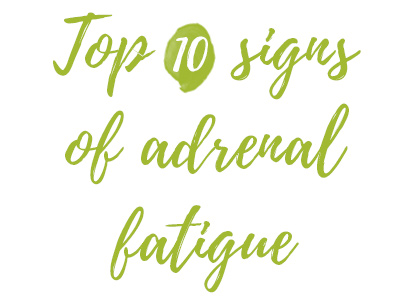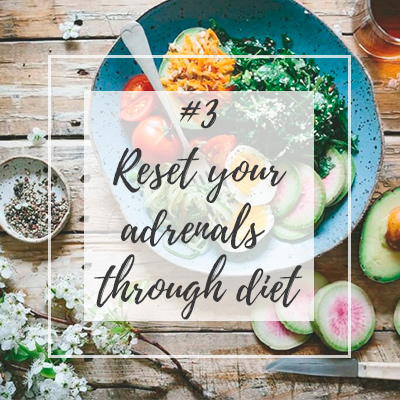
Adrenal Fatigue
The ins and outs of adrenal health and how it relates to fertility
Today we will cover: what is adrenal fatigue, symptoms and causes of adrenal fatigue, how it can impact fertility, and how to treat and reset your adrenals. We’ll also discuss lifestyle modifications and a diet for adrenal fatigue, herbs, nutrients and supplements that help with adrenal fatigue, and even how your mindset might be affecting your adrenals. Let’s start with identification.

1. Decreased ability to handle stress
2. Fatigue or lack of energy, especially in the early morning and late afternoon
3. Brain fog
4. Craving salt
5. Need to snack or eat frequently to maintain normal blood sugar
6. Dizziness upon standing
7. Mild anxiety or depression
8. Insomnia
9. Decreased Immune Function
10. Gaining weight around the midsection
CAUSES OF ADRENAL FATIGUE
 Prolonged Stress
Prolonged Stress
One of the MAIN functions of the adrenal glands is to mount a response to stress by secreting cortisol and adrenaline hormones. This is often referred to as you “fight or flight response,” which is a healthy and necessary response to help us appropriately manage those acute periods of stress. The issue arises when stress becomes prolonged, as this adaptive response becomes maladaptive.
 Excessive Exercise
Excessive Exercise
This may be one of the most commonly overlooked areas in healthcare. Just like anything else, too much of a “good thing” can be a bad thing. With the emergence of unrealistic social media-created ideals, the epidemic of excessive exercise and burnout is on the rise. Exercise is indeed a stress to the body, which causes a release of catecholamines and cortisol. A degree of stress through exercise is healthy and necessary for growth and adaptation; however, chronic over-exercise turns this anabolic activity into a catabolic one. Not only can over-exercise lead to muscle breakdown, but it can also wreak havoc on your endocrine and immune systems, leaving you victim to increased fatigue, decreased stress resilience, hormone imbalances, and lowered immune function.
Lack of Sleep
During a restful night of sleep, cortisol is at its lowest and your adrenal glands essentially get a rest. With a normal cortisol/melatonin rhythm, melatonin (your sleepy hormone) starts to make a sharp rise and cortisol (your awake hormone) takes a deep dip just before 9 pm. This 9 pm mark is thus the IDEAL time to start winding down for bed. This reverse of this pattern, where cortisol begins to spike and melatonin dips low occurs just before 6 am. The further your sleep pattern deviates from this innate cortisol/melatonin rhythm, the greater the distress on the health of the adrenal glands.
Chronic Pain
Severe pain has a profound impact on the health of the adrenals. Severe pain, whether acute or chronic, is viewed as an acute stressor by the endocrine system. Initially, the increased demand on the adrenals causes a large rise in cortisol. Over time, however, the adrenal glands are unable to keep up with demand and cortisol often drops below the normal range.
Poor Diet (Crash dieting, fasting, insufficient intake)
One of cortisol’s main roles is to keep blood sugar stable. It does so by taking blood sugar out of stores when blood glucose starts to drop below acceptable levels. With crash dieting, fasting, or insufficient nutrient intake, the demand for cortisol increases, which places an additional stress on the adrenal glands.
HOW YOUR ADRENAL HEALTH IMPACTS YOUR FERTILITY

It lowers progesterone
Our hormones aren’t created and metabolized in isolation; rather, they act as a cascade! Progesterone is a precursor hormone to cortisol. This means that when stress increases, more progesterone is shuttled to make cortisol and progesterone subsequently decreases. Adequate progesterone is necessary for the support of the developing embryo, implantation, and preventing a miscarriage.

It lowers GNRH
The hypothalamus is found in the brain and acts as the chief endocrine gland. It controls the release of all hormones and is sensitive to regulatory feedback. Gonadotropin Releasing Hormone (GNRH) is released by the hypothalamus to signal the pituitary to release FSH and LH. FSH is important for egg maturation and LH is important for ovulation. Thus, without appropriate GNRH signaling, egg development and release can be impaired or even halted. This is an extremely important factor to consider in hypothalamic amenorrhea.

It negatively impacts thyroid function
The hypothalamus also controls thyroid hormone production by releasing Thyrotropin Releasing Hormone (TRH), which then signals the pituitary to release Thyroid Stimulating Hormone (TSH) to stimulate your thyroid to release thyroid hormone. In periods of chronic stress, this too is shut down! Furthermore, both physical and emotional stress will increase the production of reverse T3 (rT3), an inactive thyroid hormone. Now only does the production of rT3 take away from your production of T3 but also docks on the T3 receptor site, blocking your active T3 hormone from binding. To learn more about how low thyroid function and thyroid antibodies can negatively impact fertility, read my blog “Thyroid Optimization for Fertility.”

It increases SHBG
Elevations in cortisol during stress trigger the liver to release more sex hormone binding globulin (SHBG). SHBG is a protein that will bind testosterone. When testosterone is bound, it is not free to act on cells. Moreover, total testosterone has little relevance; rather, free testosterone is what matters! When it comes to fertility, testosterone is essential for egg quality AND sperm health. Furthermore, adequate testosterone is necessary for a healthy libido, an important factor when trying to conceive.

TOP 5 TIPS TO RESET YOUR ADRENALS:

Aim to get a minimum of 8 hours of sleep each night. Some individual’s recovering from adrenal fatigue may need more, so listen to your body! Each hour before midnight counts as double, so aim to get to bed by 9 pm!

Set time limits on exercise
Exercise is healthy, right? Well, it can be a detriment to your health if you are consistently overdoing it. When recovering from adrenal fatigue, it is extremely important to keep exercise at a moderate level. I typically recommend patients to keep exercise to a maximum of 1 hour of moderate exercise (such as: light cardio, resistance training, and yoga). This is not the time to do intense spin classes, cross-fit, HIIT workouts, or Bikram yoga.
Dial back your homework commitments
For many individuals, work is a significant source of stress. This may especially be the case if you consider yourself “type A” or a people-pleaser. Make sure that you are not taking on more tasks than you can handle. Consistently working overtime, working in an emotionally toxic environment, working under high pressure of time or significance, and making long commutes can all contribute to burnout. It’s a good practice to pull out your contract and evaluate whether you are going above and beyond the job duties for which you were originally hired.

The main goal of an adrenal reset diet is to use macronutrients (carbohydrates, fats, proteins) to promote a healthy cortisol/melatonin rhythm through blood sugar modulation.
Three principals to keep in mind:
- We want cortisol around — but at the right time. Cortisol, your “stress hormone” gets a bad rap. In excess and for prolonged periods of time, cortisol can indeed be bad; however, cortisol has many IMPORTANT beneficial roles in our body including: blood sugar regulation, blood pressure regulation, anti-inflammatory actions, and energy!
- Cortisol and Melatonin are in opposition. When Cortisol is high, melatonin is low. The reverse is also true.
- Cortisol and Blood Sugar are in opposition. One of cortisol’s roles is to regulate blood sugar by taking sugar out of its storage form and putting it into the bloodstream when blood glucose is low. This means that when blood glucose is low, cortisol will rise in order to achieve this act. This is one reason why cortisol levels RISE after exercising.
PROMOTING A HEALTHY RHYTHM WITH STRUCTURED MEALS:

Breakfast should consist of a healthy protein, healthy fat, and good amount of vegetables with adequate fiber. This type of breakfast will keep morning cortisol high, as it should be.
Example: 2 Eggs (whole) + 2 pieces bacon + ½ avocado + sautéed kale

Mid-day is the time where cortisol begins its decline. To maintain a relatively high level of cortisol, eat a lunch high in protein. If your body is already at a point of “adrenal fatigue,” it may not be able to meet these demands, and could result in some irritability. Alternatively, eat about ½ cup of carbohydrates to encourage a natural decline in cortisol.
Example: 6 oz Chicken + salad greens + oil vinegar dressing + ¼ cup pistachios + ½ cup blueberries

It’s finally time to start dampening that cortisol response and stimulating melatonin production! This is accomplished with a healthy portion (about 1 cup) of carbohydrates. If your meal is too low in carbohydrates, more cortisol will be released to help balance blood sugar, which could prevent you from falling asleep!
Example: 6 oz grass-fed burger lettuce wrapped with avocado, mayo, and mustard + 1 cup sweet potato wedges + asparagus

Snacks are important, and don’t let anyone tell you otherwise. If you are in the stage of adrenal fatigue where your body is unable to mount an appropriate cortisol response, keeping your blood sugar stable can become quite difficult. For this reason, I usually recommend eating a high protein snack between meals, such as an Epic Bar, protein shake, or plain Kite Hill Greek yogurt!
OTHER TIPS:
Avoid Stimulants: such as coffee and energy drinks. If you need caffeine, I recommend drinking green tea, which also contains L-theanine, an amino acid that helps calm the mind by mimicking GABA.
Eat Plenty of Sea Salt: Many individuals with adrenal fatigue will crave salt due to low aldosterone, another steroid hormone produced by the adrenals. Aldosterone’s main role is to help control blood pressure through the regulation of salt content within the body. With declining aldosterone, dehydration and lowered blood pressure ensues. Increasing your intake of sea salt and trace minerals is a good way to offset some of the symptoms of lethargy, headaches, lightheadedness, irregular heartbeat, and muscle weakness.

Make relaxation and mindfulness activities a daily practice in your life:
- Meditate and/or Pray More
- Start a Journal
- Take Deep Breaths
- Laugh More
- Ground Yourself in Nature

B Vitamins play a big role in the stress-response and can become depleted over time with chronic stress. Vitamin C has been shown to increase stress-resiliency
DHEA is not for everyone, and can have serious consequences if used inappropriately. However, DHEA, a pro-hormone to both testosterone and estrogen, is very helpful in those that have reached complete adrenal exhaustion, where DHEA has also begun to drop.
Phosphatidylserine reduces cortisol. This can be extremely helpful with a disrupted cortisol rhythm that is keeping you from sleeping!
Adaptogenic Herbs have been found to help the body adapt to stress and move you towards a greater state of balance. I’ve listed some of my favorite adaptogens: Holy Basil, Ashwaghanda, Astragalus, Glycyrhiza (Licorice), Avena Sativa, Scutellaria, Schisandra, Eleuthrococcus senticosus (Ginseng), Rhodiola
Glandulars are the glands of other animals. Relying on the hormones of another animal’s adrenal glands is not a long-term solution, but can be taken to help get you through the day when you are not able to create sufficient amounts of your own adrenal hormones.
Do you believe you Adrenal Fatigue could be impacting your fertility?
Make an appointment to get your adrenals tested today and have a plan created that is right for your individual state!



